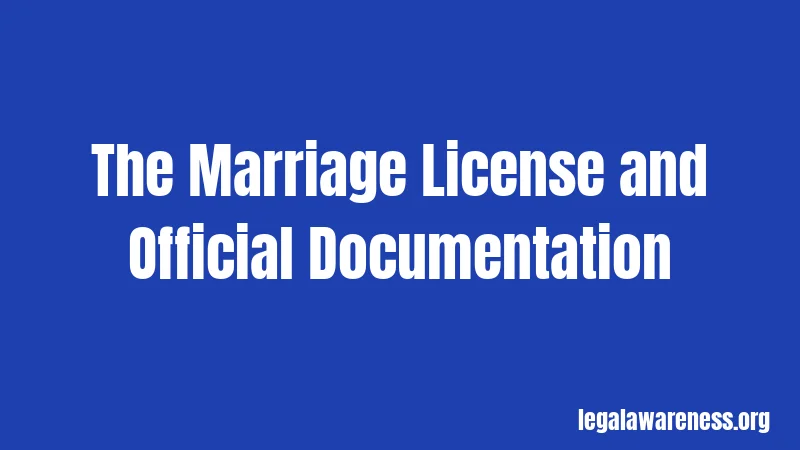Texas Marriage Laws in 2026: What Actually Matters
You probably think getting married in Texas is straightforward. Show up, say “I do,” and boom—you’re married. But hold on. There’s actually more to it than that. Texas has specific rules about who can get married, what paperwork you need, and how long you have to wait. Some of these rules might surprise you. Let’s break down exactly what you need to know before you tie the knot.
The good news? Texas is pretty straightforward when it comes to marriage. The state doesn’t make it overly complicated. But skipping the right steps? That can cause real problems later. We’re talking disputes over who’s actually legally married, tax issues, and inheritance complications. That’s why understanding these rules matters now.
What Is a Legal Marriage in Texas?

Okay, this one’s important. In Texas, you can actually get married in two different ways. One way is the standard route—you get a license, have a ceremony, and get it official. But Texas also recognizes something called “common law marriage” (also called marriage without formalities). Yep, you can literally be married without ever having a ceremony or getting a license. Right?
Here’s what makes a common law marriage legal in Texas: You and your partner agree to be married. You live together in Texas. And you introduce each other to people as husband and wife (or spouse). If all three of those things are true, you’re legally married in Texas. No ceremony needed. No paperwork required. Pretty straightforward, actually.
That said, most people still do things the traditional way. And honestly, that’s the safer route if you ever need proof of your marriage.
Basic Texas Marriage Requirements
Age Requirements
Let’s start with the basics. You have to be at least 18 years old to get married in Texas without anyone’s permission. That’s the hard rule.
But here’s where it gets interesting. If you’re 16 or 17, you CAN still get married. Your parents have to consent, though. And a judge has to approve it. Not just any judge—it has to be a district judge. So technically, minors can marry in Texas, but it’s not easy or automatic.
If you’re under 16? You cannot get married in Texas. Period. The state doesn’t allow it, regardless of parental consent.
Mental Competency
Both people getting married have to be mentally capable of understanding what marriage means. This isn’t about being super intelligent. It’s about being able to comprehend that you’re entering into a legal contract with another person.
If you’re under the influence of drugs or alcohol, you might run into problems later. If someone claims you weren’t mentally capable when you got married, it could get messy. So basically, don’t show up to your wedding drunk. (This shouldn’t need to be said, but here we are.)
No Existing Marriages
You can’t marry someone if either of you is already married to someone else. This sounds obvious, but it’s a real rule. If your spouse hasn’t finalized their divorce, the new marriage isn’t valid in Texas.
Here’s the tricky part: Your previous divorce has to be finalized. Separated doesn’t count. Filed for divorce doesn’t count. Actually divorced does. If there’s any question about whether your divorce is final, get legal help before remarrying.
Getting a Marriage License in Texas

The License Application
This is step one if you’re doing things the traditional way. You both need to go to the county clerk’s office together. You’ll fill out an application. Bring your ID—you’ll need it. Your Social Security number is required too.
You can apply for a license in any Texas county. You don’t have to do it where you live. If you’re getting married in Austin but live in Dallas? That’s fine. Just apply in the county where you want to get married.
Both of you have to be present when you apply. One person can’t apply for both. The clerk is going to verify your identity and basic information. They’ll also make sure neither of you are already married (they’ll check against Texas records).
Waiting Period
Okay, here’s where patience comes in. Texas has a 72-hour waiting period. After you get your license, you have to wait three days before you can actually get married. The clock starts at the moment the county clerk issues the license.
Think of it like this: Apply on Friday. You can get married on Monday (three days later). Not before. The state’s reasoning? The waiting period gives people time to back out if they’re having doubts. Make sense?
You CAN get married sooner than 72 hours if a judge waives the waiting period. But you have to get a waiver first. The judge needs a good reason—like you’re leaving the state for military service. Just being impatient? That won’t cut it.
License Validity and Cost
Your marriage license is good for 30 days from the date it’s issued. Get married within that window. After 30 days? The license expires. You’d have to apply for a new one (and wait another 72 hours).
The cost varies slightly by county. Most counties charge between $50 and $100. Not super expensive, but it’s not free either. Bring a checkbook or be ready to pay with a debit card.
What You Need to Bring
Don’t show up unprepared. You’ll need valid photo ID for both people. A driver’s license, passport, or state ID all work. You’ll also need your Social Security numbers. If you’ve been married before, bring divorce documents or a death certificate (if your spouse passed away).
Wondering about birth certificates? Most counties don’t require them. But bringing one doesn’t hurt.
The Marriage Ceremony
Who Can Officiate?
This is pretty flexible in Texas. A lot of people think only ministers or judges can marry you. Not quite. In Texas, any person can marry you as long as they’re authorized to do so. Here’s what counts:
Any licensed minister, priest, rabbi, or other clergy member can do it. Judges and justices of the peace can do it. And here’s the cool part—anyone else can too, if they’re officially authorized by a religious organization. So if your best friend gets authorized by a church or other religious group, they can legally marry you.
Just make sure whoever is marrying you signs the marriage license afterward. That signature is crucial. Without it, the marriage isn’t official.
Venue Requirements
You can get married almost anywhere in Texas. Your backyard, a fancy venue, a courthouse, a church. No specific rule says you have to do it in a certain place. Just make sure the person officiating is willing to show up.
One note: If you’re doing a civil ceremony (non-religious), make sure your officiator is comfortable with that. They have rights too.
The Marriage License and Official Documentation

Getting the Certificate
After you get married, the officiant has to fill out the marriage license and turn it in to the county clerk. This usually happens within 30 days. Once it’s filed, the county clerk issues you a marriage certificate.
Your marriage certificate is official proof that you’re married. You’ll need it for changing your name, updating your Social Security card, health insurance, and a bunch of other stuff. Don’t lose it.
Name Changes
Texas makes name changes super easy for women getting married (and anyone else who wants to). When you get your marriage certificate, you can request a name change at the same time. Just fill out the name change form at the county clerk’s office.
Honestly, this is the part most people miss. You can change your name for free right then and there. No extra legal paperwork needed. Just ask the clerk. They’ll handle it on the spot.
Men can change their names too. Anyone getting married can request a name change. It’s not automatic, but it’s simple and free if you do it when you get your marriage certificate.
Marriage Rights and Responsibilities in Texas
Spousal Property and Finances
Here’s where marriage gets real legally. When you marry in Texas, you become responsible for certain debts and entitled to certain property. Texas is a “community property” state. This means property acquired during your marriage (with some exceptions) belongs to both of you equally.
That new car you bought while married? Community property. Your spouse’s debts from before you got married? That’s their separate property. But debts acquired during the marriage? You’re both on the hook.
This matters because it affects everything from taxes to bankruptcy to divorce. If you’re bringing significant assets or debt into a marriage, talk to a lawyer. A prenuptial agreement can protect you both.
Spousal Benefits and Legal Standing
Being married gives you automatic legal standing. You can make medical decisions for your spouse if they’re incapacitated. You inherit automatically if your spouse dies without a will. You’re covered under their health insurance and Social Security benefits.
This is one reason legal marriage matters beyond just the romantic part. These legal protections don’t exist for unmarried partners, even if you’ve been together for decades.
Restrictions and Prohibitions
Who Cannot Marry in Texas
Texas has some restrictions on who can marry. Family members can’t marry each other. This includes parents and children, siblings, grandparents and grandchildren, and aunts/uncles with nieces/nephews.
The rule also covers people related by marriage (in-laws), but only in certain situations. Marrying your cousin? Texas allows it. Marrying your sibling? Absolutely not legal.
Marriage Between People of the Same Sex
Texas recognizes same-sex marriage as fully legal and valid. After the Supreme Court ruling in 2015, all states—including Texas—had to recognize same-sex marriages. You have the exact same rights and responsibilities whether you’re marrying someone of the opposite sex or the same sex.
Other Restrictions
You can’t marry someone you’re already related to (as mentioned). You also can’t marry someone if either of you is already married. That’s bigamy, and it’s illegal. If you’re unsure about whether your previous divorce is final, check before applying for a new license.
Common Law Marriage in Texas
How It Works
Remember earlier when we said you can be married in Texas without a ceremony or license? This is it. Common law marriage is recognized in Texas, and it has real legal consequences.
To be in a common law marriage in Texas, you need three things: an agreement to be married, living together in Texas, and representing yourselves to others as married. All three have to be present.
Proof of Common Law Marriage
Here’s the catch: If you’re ever in a dispute about whether you’re married, you have to prove it. This is where it gets tricky. You might have texts saying you’re married. You might have introduced each other as spouses. You might have filed taxes as married.
But Texas doesn’t give you automatic documentation like it does with licensed marriages. You’d need to prove your common law marriage in court if the other person disputes it. This is messy and expensive.
This is why getting a license is honestly the smarter route. It’s simple, cheap, and gives you paperwork to prove you’re married.
Registering a Common Law Marriage
Texas allows you to register your common law marriage with the county clerk. This is totally optional but smart if you’re in a common law marriage. You both sign an affidavit saying you’re married. The clerk files it.
Now you have official documentation. You don’t have to fight in court to prove your marriage if something goes wrong. For anyone in a common law marriage, registration is worth doing.
Prenuptial and Postnuptial Agreements
What These Agreements Do
A prenuptial agreement (signed before marriage) or postnuptial agreement (signed after marriage) lets you decide how property is split if you divorce. You can also protect assets you want to keep separate.
Texas enforces these agreements, but they have to meet specific requirements. Both people have to understand what they’re signing. You can’t hide assets or deceive each other.
When These Matter
If you or your spouse have significant assets, kids from previous relationships, or a business, these agreements make sense. They protect everyone involved and remove a lot of fighting if divorce happens.
But they’re not required. Most people getting married don’t use them. If you’re young, have similar income, and no major assets, you probably don’t need one.
Legal Requirements
Both people need their own lawyer. (Yes, both people. Separate lawyers protect both sides.) The agreement needs to clearly state what’s being protected and why. It can’t be super one-sided—courts might throw it out if it’s totally unfair.
Getting these done is worth the investment if you need them. Spending $500-$1,500 now beats spending $30,000 on lawyers fighting over property during a divorce.
Recent Changes to Texas Marriage Laws
What’s Changed Recently
Texas marriage law has been pretty stable. The biggest recent change was the 2015 Supreme Court ruling making same-sex marriage legal nationwide. Texas had to implement this, and it did.
In 2023, Texas expanded some marriage-related protections for same-sex couples regarding adoption and medical decision-making. These are technical changes that made the law more consistent.
Stay updated. Laws can change, and what’s true today might shift. If you’re planning a big life decision based on marriage law, check the current rules or talk to a lawyer.
Frequently Asked Questions
Can I marry my cousin in Texas? Yes, you can. Texas allows marriage between cousins. It doesn’t allow marriage between siblings, parents and children, or grandparents and grandchildren.
What if I want to elope without telling my family? You’re an adult (assuming you’re 18 or older). You can absolutely get married without your family knowing. You just need a valid ID, your Social Security number, and the marriage license process.
Can I get married online or by mail in Texas? No. You both have to show up in person to apply for the license. And you both have to be present for the actual ceremony (with rare exceptions). You can’t get married entirely by mail or video.
What happens if I miss the 30-day deadline on my marriage license? The license expires, and you’d have to apply for a new one. You’ll start the 72-hour waiting period all over again. It’s not a huge deal, just annoying. Don’t let it expire if you’re planning to get married soon.
Do I have to change my name when I get married? No. Changing your name is completely optional. You can keep your maiden name, use your spouse’s name, or create a hyphenated version. It’s entirely your choice.
Final Thoughts
There you have it. Texas marriage law is pretty straightforward. Get a license, wait 72 hours, get married, file the paperwork. Done. If you’re doing common law marriage, just live together, agree to be married, and represent yourselves as married.
The rules exist to protect everyone involved. They make sure you’re mentally capable, not already married, and old enough to understand what you’re doing. They also create official documentation so you have proof of your marriage when you need it.
Now you know the basics. If you’re planning to get married, follow the steps. Get your license. Bring your ID. Find someone to officiate. Wait your 72 hours. Then say yes and start your life together.
Any questions that aren’t answered here? Talk to a family law attorney or visit your county clerk’s office. They can walk you through the process. You’ve got this.
References
- Texas Family Code, Chapter 2 – Marriage – Official Texas statutes covering marriage requirements and procedures
- Texas Health and Human Services – Vital Statistics – State resource for birth certificates, marriage records, and name changes
- Texas County Clerk Association – Directory of county clerk offices where you apply for marriage licenses
- State Bar of Texas – Lawyer Referral Service – Find a family law attorney if you need legal guidance
- Texas Vital Records – Marriage Information – Official information about obtaining marriage certificates and registration requirements
